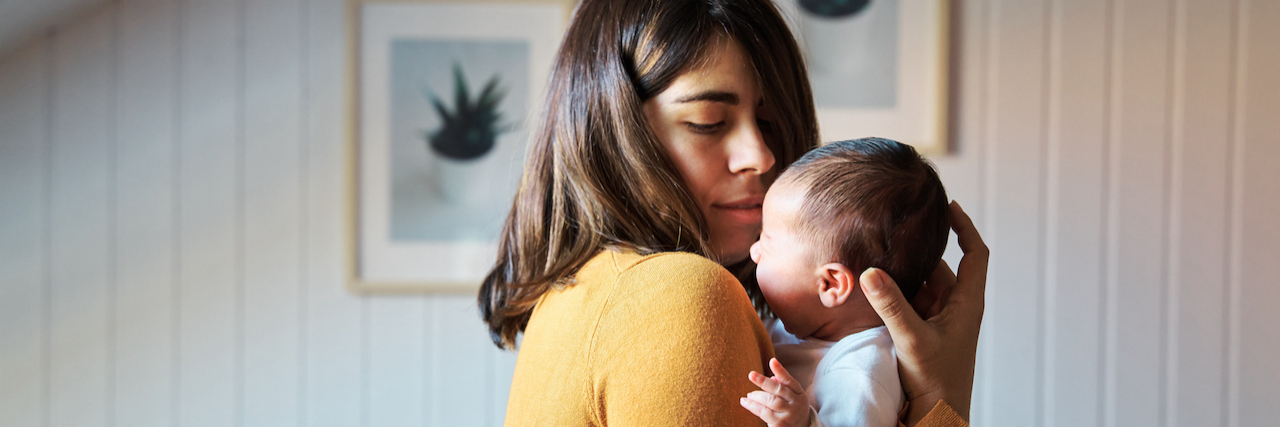I don’t need reassurance from friends that formula feeding is adequate. The hospital nurses’ salvos on the virtues of breastfeeding didn’t tempt me. When milk leaked through my shirt at the sound of my newborn crying, I changed shirts and grabbed a bottle. Throughout my baby’s four months of life, I’ve been happy to formula feed, glad that an option exists for me to nourish my child. During her early morning meals, I cuddle her in my arms, telling her about our day ahead.
• What is Bipolar disorder?
“It’s Friday, so you know what that means, honey,” I say. “Daddy’s working on campus today. It’s you and me.”
She suckles noisily, resting her hand on the bottle.
“Lola is taking the train from Milwaukee in the afternoon,” I say.
She regards me with her eyes for a second, continuing to drink the formula.
“And Ninang found more milk,” I say. “Five bottles. She’s going to pick them up today.”
One big bottle equals one day. A small tub of powder lasts four days. A big tub, one week. Those travel-size packets we bought for trips — I’ll count how many came in the box.
My sister texts me updates on canceled orders, photos of bottles in the backseat of her car. I sign up for a free trial of an expensive grocery delivery service because they have my daughter’s preferred formula. First came the limits, signs barring you from more than three or four bottles. Then the shelves got sparse before they emptied.
I refresh store web pages and follow trails to undelivered orders to get my daughter more formula. My milk dried up months ago. I don’t know how to get it back. If I can. Sometimes I look down at her cheeks during a feeding and I imagine breastfeeding. Would we be closer if I breastfed? Would you be stronger, healthier, cry less?
My baby drinks her whole bottle. I wait for her reaction. She squirms, frowns. Then she arches her back to look at the bookshelf behind her.
She’s full. I carry her to the bookshelf. She stares at the colorful spines, a bright red paperweight. Later, I’ll check our tracking app for how much she’s eaten so far. Estimate how many more feedings until bedtime. I’ll look at the previous day, average the ounces, come up with an amount that is exactly one big bottle. Good, I think. One bottle, one day.
A couple times during skin-to-skin sessions, my baby started going for my nipple. I blocked her mouth with my hand, shifted her higher on my chest. My psychiatrist said if I decided to breastfeed, my baby would need to be closely monitored for toxicity, probably including regular blood tests.
I don’t regret my decision not to breastfeed, but sometimes I do wish I wasn’t on lithium. Or anything at all out of my daily handful of white and blue tablets. I change my daughter’s diaper in the middle of the night and I search the windows of the office building across the street for crime scenes. Was that the shadow of an intruder or a photocopier? If I see anything, should I report it, or will the perpetrators track me down — track us down? I don’t wish I breastfed, but I do wish I was a different person, a different kind of mother.
I would like to stop looking for crime scenes. Not be surprised when I get out of bed in the morning. Plan out the months ahead without budgeting for a breakdown. I would like to stop rehearsing how I will tell my daughter that I am sick. How to prove that I’m trying.
Maybe none of this has anything to do with breastfeeding. My breasts don’t fit in my shirts anymore. I read that my nipples grew darker in order for my baby to see them better. I’m scrambling along with lots of parents, breastfeeding and formula feeding, to change zip codes on pharmacy websites, Google the cans of formula that remain on the shelves. Is soy formula OK for her? If I leave a couple bottles, does that mean I’m not hoarding?
After my daughter eats, I need to hold her upright for 10 minutes so she doesn’t spit up. She used to spit up all the time. But since we started holding her upright, she usually doesn’t. I set a timer, sometimes play a song from her playlist. I sit her on my lap, pose her arms like she’s dancing. Sometimes she is very chatty, rattles on: “Na nana na. Nanana na.”
“Oh, really?” I say. I read I’m supposed to pretend I understand her. “You want to play more? You miss Lola? You’re interested in the rain?”
She stares at me with huge eyes. I study her fidgeting hands. She sucks on her fist. This is the most important person in my life, I think to myself. She continues to babble. I keep asking.
Getty image by juanma hache

